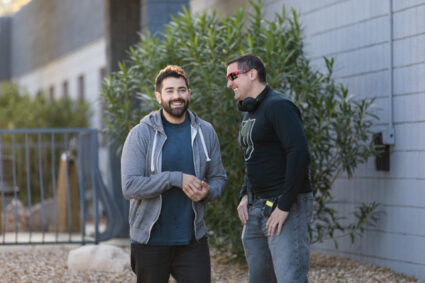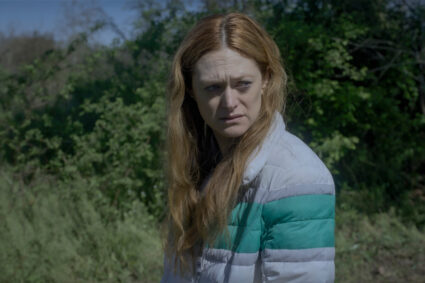
On this edition of INTERVUE, I always get a thrill when I am in interviewing first-time director. Although today’s guest has recently director her first film which gotten good praise at Sundance Film Festival, she has been in the business for over a quarter of a century. Infinitely Polar Bear is a sleeper hit that touches on a delicate subject matter while touches your heartstrings at the same time. Today, we are talking to writer/director Maya Forbes
As we know Infinitely Polar Bear touched on a powerful subject of Bipolar Disorder. It’s even more powerful since the mental illness is more prevalent that it hits everybody. I would like for you to share with us the experience you had dealing with Bipolar Disorder.
Making the film, writing the film or living it?
All three.
I wanted to tell the story because, as you said, it touches everybody and it’s a family issue. When you’re dealing with mental illness, whether it’s your mother, father, sister, daughter, brother, it becomes a family issue. The whole family grapples with it. Living with my father was very complicated, emotionally because I loved him but I was often angry with him. He frustrated me. He was fun. He broke my heart because I always wanting him to pull it together and be happy and find a positive place for himself but it was hard. I wanted to write a film that sort of touched on all of those things. I also wanted to be an entertaining, sad story. Those were like my adjectives like “energy”, “life”, “entertaining”, “funny”, and “sad”. (We both chuckle)
This was a tough challenge to balance both humor and drama within the film’s subject matter. How were you able to create that balance?
I wanted to be true to life, which is I think a lot of that humor comes from the fact that the girls are so under waved by the thought of their dad.
(Yes, they are)
Yes, they are very annoyed and very fierce and strong. I found my father felt that he was funny and that our dynamic was funny. I just wanted to portray a person, a man who happened to be bipolar. The man starts first and the bipolar is part of him but it’s not all that he is. The movie asks a central question that is “Can a bipolar person be a good parent?” and my feeling is absolutely. I know that’s true. I think it would be helpful for people that are struggling with these issues if it were easy to get help. I think when you’re bipolar, different things work for everybody. So, its a process of finding what works for you. Finding the medication that works for you or whether it’s less medication and more of some kind of behavioral therapy. I feel that if you’re hiding it, you can’t get the help that you need.
The performances of the film are extraordinary and that’s all thanks to the talents of Ruffalo & Saldana as Cam and Maggie Stuart. How were you able to bring such talent to “Infinitely Polar Bear”?
I written a script that I feel that the tone you asked about and the humor and the pathos was in the script. Both Mark and Zoe responded to that. That’s a combination that I always wanted to see in the movie. I feel the actors wanted to see it because it speaks to the human condition because we are not all one way or the other especially when you’re telling a real authentic story. It’s going to be funny and going to be sad. Otherwise, you would leave out a major part of life. With Mark, he read the script and he responded to that tone. He could see that this was a fun part to play. When I met him, he was so funny and I thought “Oh my gosh, He’s so funny, he’s perfect because he’s funny that he’s natural that way. Zoe was the same. When she read it and she started laughing and crying at every page.
You have your middle daughter, Imogene; play Amelia Stuart in the film. Did you have Imogene in mind when casting the role and did she enjoy the experience?
I am a good friend of Wes Anderson. You can tell that he is amazing director who does not follow the rules.
I am a huge fan of his films.
He’s an amazing creative force who makes the rules. Anyways, I was talking to him and stated, “I am worried about trying to cast these two kids”. He said that I should cast Imogene and Clementine, my older daughter.
She was also in the film, correct?
Yes she’s at the end of the film. I say “What, I can do that?” “Of course, you can do that. What can do you? You got to do that”. That kind of opened the door to “Wait a second, I didn’t even think about that”. Of course, I was writing this movie, looking at my two little girls, picking some of their behavior for the movie. So, it makes complete since but you never know if your kid can act or not.
After a few years passed by, Clementine got too old to be in the film. We originally did a table read with Zoe & Mark with Imogene reading for Amelia. She was 9 at the time. After that table read, I knew that she could do this. Mark & Zoe both said that she was a natural and that she could totally do it. I was worried that she would be too old because it was really important to me that they be kids not teens because its so much funnier to have younger kids so irritated with their father. I don’t know if you would have the same sympathy for a teenager than a little kid.
Were you able to have Zoe and Mark interact with your family, prior to filming, to create that feel of family needed for the movie?
For Mark, my father died in 1998, so he cannot meet my father but I told him tons of stories and showed him lots of pictures and video of my father speaking. I had this one video of my father reading a “New Yorker” article to his parents. I also showed him some Super 8 videos that my father shot of himself when he was manic. We worked a lot of on the way my father spoke. We did a lot of work over the course of three years where Mark was attached to the film before we shot. When we got to the set, I told him to just take the essence of it. Make this yourself because I don’t want you to feel that you’re putting something on, it has to feel really real.
Then, Zoe met my mother and they had lunch together. They talked over the phone and I showed her lots of pictures. Both of them wanted as much as I could share with them. Letters, pictures, stories that they soak as much of it up.
One last question, what’s the story behind the title of the movie?
We had this period of time when my father was taking care of my sister and I and we kind of took care of him – a little unit. It was during the time; my sister and I were attending a boarding school, which my mother was working so hard to get us in. My father had a hard time staying stable after we left. When we were both in college, he was having a manic episode, as he often did in the spring. We took him to McLean Hospital because we felt like he had to be hospitalized. He came willingly that he was in an agreeable manic mood. As he was filing out the intake form, it asked him “What’s his diagnosis: Manic, Schizophrenic, other?” He wrote next to other “Infinitely Polar Bear”
Thank you Maya for the wonderful interview. Be sure to check Maya’s directorial debut, Infinitely Polar Bear from Sony Pictures Classics as it hits theaters in the DC Metro Area, Friday, June 26th



